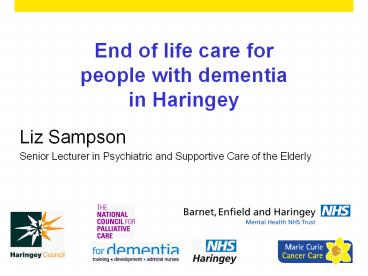End of life care for people with dementia in Haringey - PowerPoint PPT Presentation
Title:
End of life care for people with dementia in Haringey
Description:
people with dementia in Haringey Liz Sampson Senior Lecturer in Psychiatric and Supportive Care of the Elderly The National Picture Aims of the project Identify ... – PowerPoint PPT presentation
Number of Views:411
Avg rating:3.0/5.0
Title: End of life care for people with dementia in Haringey
1
End of life care forpeople with dementia in
Haringey
- Liz Sampson
- Senior Lecturer in Psychiatric and Supportive
Care of the Elderly
2
The National Picture
- National Service Framework for Older people. 2001
- Palliative Care fourth report of session.
2003-04 - Everybodys Business Integrated mental health
services for older adults a service development
guide. 2005 - Gold Standards Framework 2005
- Who Cares Wins. 2005
- Improving services and support for people with
dementia. 2007 - Dementia Strategy. 2008
- End of life care strategy. 2008
3
Aims of the project
- Identify barriers for dementia patients and their
carers to access good quality end of life care
- Identify cost effective improvements based on
findings
4
Project plan
Feb 09
Nov 09
Project protocol
Focus groups
Phase 1
Phase 2
Data analysis
Report findings
Carer interviews
Stakeholder review
Recommendations
Stakeholder engagement and endorsement
Case note review
Dissemination
5
Stakeholder group
- Representation from
- Health
- Social Services
- Voluntary organisations
- Commissioning
- Care providers
- Expert by experience
6
Data collection
- 12 carers approached, 7 interviewed
- (2 wives 3 daughters 1 son 1 key care worker)
- 5 focus group and 12 one-to-one meetings
- (PC team, DNs, care home managers, hospice
staff, Admiral nurses, GPs, private care agency,
OOH team, SS managers, Asian Carers, London
Ambulance acute service providers and community
staff) - 9 case notes reviewed
7
Key themes
- Patient pathway
- Impact of hospitalisation
- Advance care planning
- Knowledge and skills
- Impact on carers
8
Patient pathway
- Reactive service relying on crisis management
- Silo practice
- Lack of knowledge of available services and
referral methods and criteria - Limited knowledge of number of patients and their
demand on services
9
Impact of hospitalisation
999/NHS direct
Patient decline
Discharge
A E
Inpatient ward
10
Resource use
- The average cost of purchasing care over the last
six months of life is estimated at 25,000 per
person - Costs are higher for people with dementia in care
homes and hospitals - Hospitalisation represents almost 20 of the
total average costs of care - The majority of admissions to hospital were for
ambulatory conditions that could have been
treated in the community
11
Advance care planning
- Little evidence of advance care planning
- Carer exhaustion and denial
- Silo practice
- Difficulty in predicting death
- Outcome
- Stress for carers and patient
- Inappropriate resuscitation attempts
12
Impact on carers
- Carers were frequently being asked to supply
similar information to support staff and agencies - Carers had limited awareness of the services to
which they are entitled - Carer crisis may be caused by a breakdown in the
care package - Carers might be asked to make end of life care
decisions with limited knowledge, understanding
and support - There is limited bereavement support for carers
both for relatives and care staff
13
Skills and training
- A wide range of health and social care staff come
into contact with people with advanced dementia
there is a clear need to increase their knowledge
and awareness of the likely disease progression - Care staff in residential homes
- Staff in the acute hospital
- Many staff groups reported that they did not feel
that they have all the necessary knowledge and
skills to increase the quality of support for
people with dementia
14
Stigma in community
Stigma in community
links with PC
No advance care plans
No advance care plans
No advance care plans
Ambulance policy
Ambulance policy
Ambulance policy
Ambulance policy
Ambulance policy
Ambulance policy
Ambulance policy
Ambulance policy
Lack of confidence
Lack of confidence
Lack of confidence
Lack of confidence
Patient decline
Carer exhaustion / panic
Carer exhaustion / panic
Carer exhaustion / panic
Carer exhaustion / panic
Carer exhaustion / panic
Carer exhaustion / panic
Carer exhaustion / panic
Carer exhaustion / panic
CQC framework
CQC framework
CQC framework
CQC framework
CQC framework
Locum GP / OOH
Locum GP / OOH
Locum GP / OOH
Locum GP / OOH
Locum GP / OOH
Locum GP / OOH
Locum GP / OOH
Lack of diagnosis and prognosis
Lack of diagnosis and prognosis
Lack of diagnosis and prognosis
Lack of diagnosis and prognosis
Lack of diagnosis and prognosis
Lack of diagnosis and prognosis
15
The way forward/challenges
- Proactive services, decreased hospital admissions
and deaths in hospital - More integrated working leading to improved
efficiency and cost savings - Increased education and training about dementia
- http//www.mariecurie.org.uk/dementiaproject2009
16
Project team
- Dr Liz Sampson esampson_at_medsch.ucl.ac.uk
- Dr Louise Jones ljones_at_medsch.ucl.ac.uk
- Karen Harrison Dening Karen.harrison_at_beh-mht.nhs.u
k - Wendy Greenish wendy.greenish_at_mariecurie.org.uk
- Dr Uttara Mandal uttara.mandall_at_beh-mht.nhs.uk
- Amanda Holman a.holman_at_medsch.ucl.ac.uk































